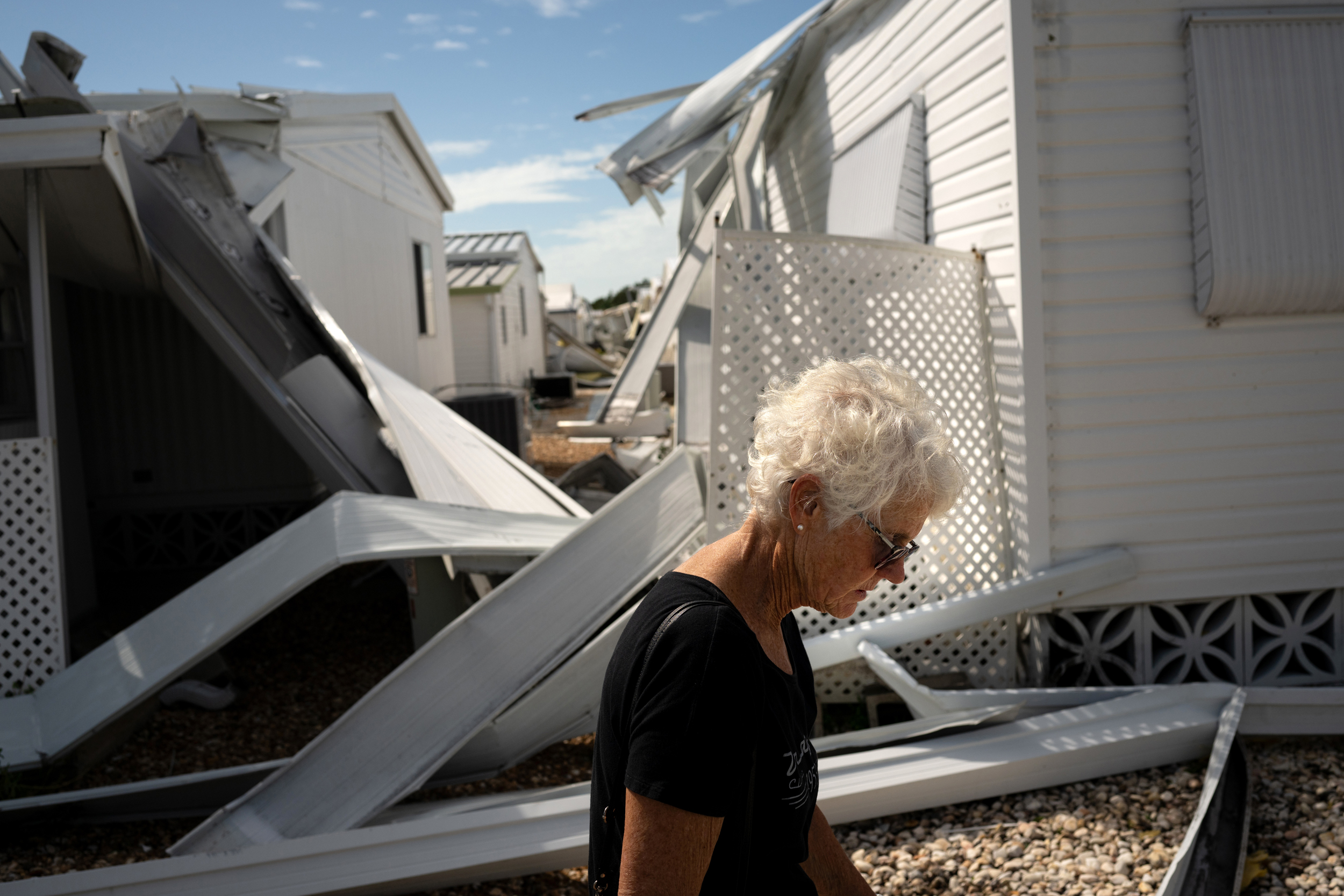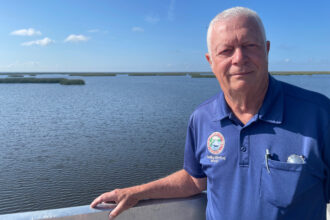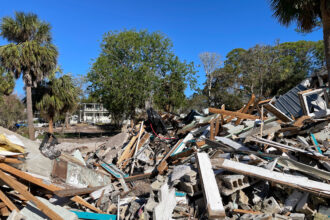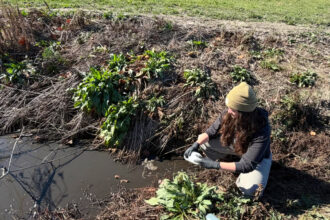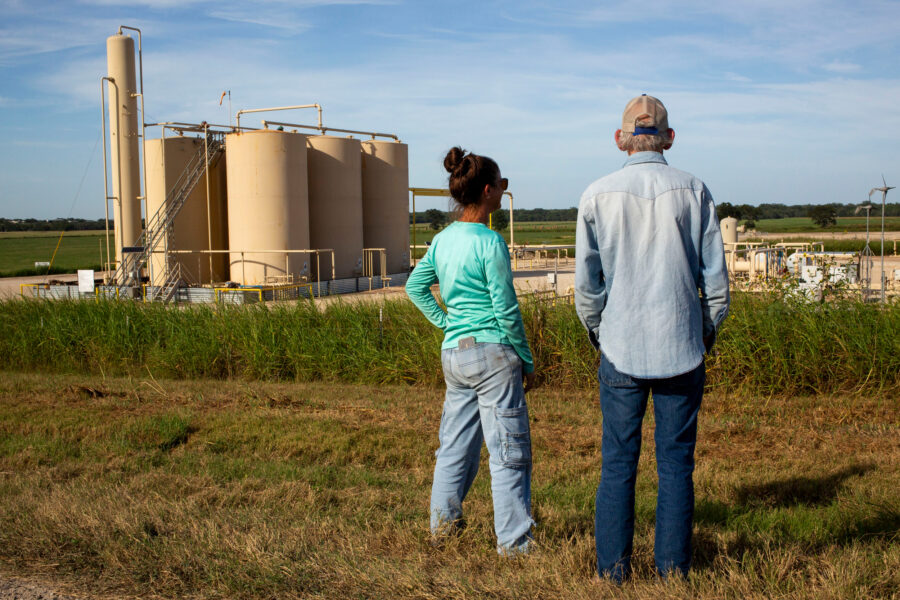Manatee County’s commissioners didn’t expect to be threatened with removal from office for considering two measures meant to enhance disaster resilience in this fast-growing county on Florida’s Gulf Coast.
The measures, both amendments to the county’s comprehensive plan, were widely supported in the sizable county that stretches south from Tampa and east from the Gulf of Mexico, encompassing beachy barrier islands and bucolic inland communities. One of the measures was intended to protect the county’s wetlands and guard against future flooding by prohibiting development within 50 feet of the marshes. The other would control sprawl by addressing a loophole that allowed development east of the county’s long-established urban boundary line. Just last year, the county weathered three hurricanes: Debby, Helene and Milton.
The measures had been in the works for a long time. But this summer the commissioners learned they suddenly were in violation of a new state law that took effect July 1, SB 180. Now the commissioners were being advised they could be removed from office for moving ahead with the amendments. An official in the administration of Gov. Ron DeSantis, a Republican, sent letters that also threatened to withhold funding from the county.
Meanwhile, local developers already had filed suit over a separate commission action to raise impact fees, which developers pay toward local infrastructure improvements. The mounting legal and political pressures compelled the commissioners during an August meeting to put the comprehensive plan amendments on hold instead of approving them as they’d intended.
“It’s incredibly difficult and frustrating because we want people to live here, but we want people to live here safely, and you’re tying our hands. You’re basically saying you all but have to allow for unlimited growth and development,” Commission Chairman George Kruse told Inside Climate News. “They’re not letting me say, ‘OK, let’s learn from our mistakes.’”
Manatee County is among 25 local governments from across the state that have now joined to sue the DeSantis administration over SB 180, which the governor signed into law in June. The measure was billed by supporters during the spring legislative session as a means of helping hurricane-stricken communities recover by temporarily easing building rules. But a last-minute amendment goes further, the lawsuit argues, prohibiting local governments from enacting land development policies that are “more restrictive or burdensome.”
The law applies retroactively, to policies dating from Aug. 1, 2024 to Oct. 1, 2027. Because of the way the law is written and the widespread impacts of last year’s three hurricanes, it affects every county and municipality in Florida.
“This is the largest intrusion into home-rule authority in the history of Florida since the current constitution was adopted in 1968,” said Jamie Cole, the lead attorney representing the local governments in the litigation, which was filed in late September. “It basically freezes all local planning and zoning regulations in place as they were on Aug. 1, 2024, until Oct. 1, 2027.”
A second lawsuit, filed Tuesday on behalf of 1000 Friends of Florida, an environmental advocacy group focused on smart growth, and an Orange County resident, challenges the constitutionality of SB 180. The litigation argues, among other things, that the measure’s ban on more restrictive and burdensome land development policies is too vague. The complaint also claims the law is inconsistent with the Florida Constitution’s “natural resources” clause, by prohibiting local actions aimed at protecting the air, water and sensitive lands.
In a state uniquely vulnerable to more damaging storms, rising seas and flooding, the law threatens to upend local efforts at balancing climate impacts with rapid growth and development, said Kim Dinkins, policy and planning director at 1000 Friends of Florida.
“Everytime we have a large storm, communities learn more about what should be done,” she said, “and how to better manage their infrastructure in order to better deal with storms. If there is no way to implement those lessons learned, then we’re just going to continue to build and rebuild in a way that is not sustainable.”
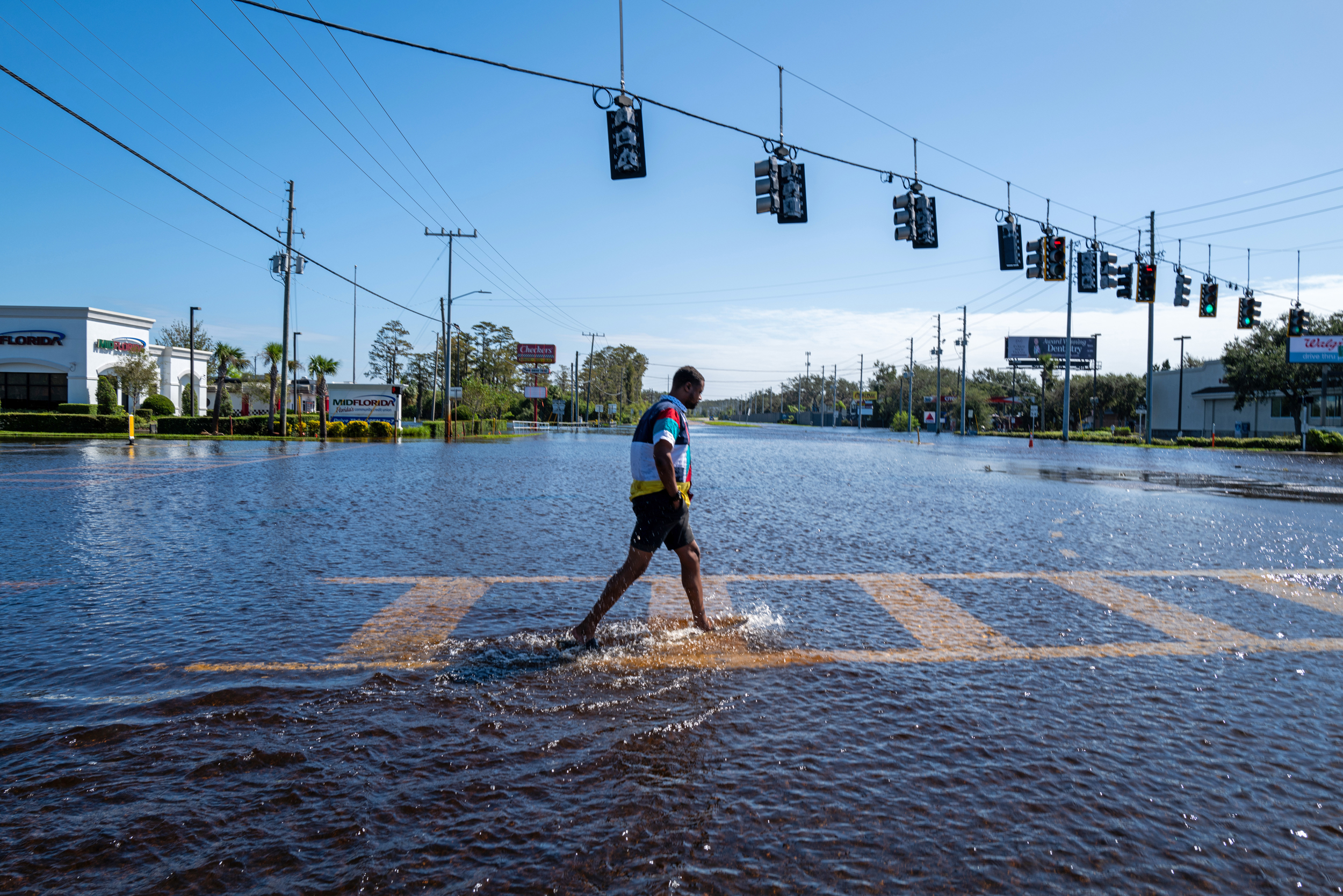
SB 180 goes to the heart of a dialogue that takes place often after a destructive hurricane in Florida. Interspersed with the widespread resolve to rebuild are aspirations to build back better, smarter and more sustainably, out of an awareness of the inevitability of future storms. After Hurricane Andrew hit South Florida in 1992 as a devastating category 5 storm, building codes were strengthened, but such changes would not be allowed under the new law, Cole said.
“Developers are able to continue with the status quo and don’t have to bear any of the burden of making Florida more resilient,” he said. “The people this was intended to protect were homeowners and the citizens of Florida. It’s the ones they are leaving out because they have to deal with the consequences of when a storm hits and continued flooding and vulnerable infrastructure.”
The law applies to counties listed in a federal disaster declaration that come at least partially within 100 miles of a storm’s path, and also to every municipality within those counties even when the municipalities did not sustain hurricane damage. The law prohibits the local governments from enacting construction or redevelopment moratoriums and prevents more restrictive or burdensome amendments to their comprehensive plans or development rules. The legislation also bans more restrictive or burdensome procedures when it comes to obtaining development permits, and it restricts changes to land development policies after future storms.
An analysis of SB 180 a lawyer prepared for 1000 Friends of Florida characterized the measure as “one of the most dangerous and ill-conceived pieces of planning-related legislation adopted in modern times in Florida.” Lobbyist disclosure records show the law was supported by some of the largest builders in the state, including Highland Homes, Homes by WestBay, North Lake Communities, On Top of the World Communities, the Tampa Bay Builders Association and The Kolter Group.
Both lawsuits were filed in Leon County Circuit Court and name as defendants Alex Kelly, state secretary of commerce; Kevin Guthrie, executive director of the Florida Division of Emergency Management; Wilton Simpson, state commissioner of agriculture; Jim Zingale, executive director of the state Department of Revenue, and Blaise Ingoglia, state chief financial officer.
Neither the DeSantis administration nor state Sen. Nick DiCeglie (R-St. Petersburg), the bill’s sponsor, responded to multiple requests for comment. During a September news conference in Hillsborough County, DeSantis noted he has both signed and vetoed bills in the past that assert state authority over local governments.
“On this one, the reason why I thought these people needed relief is because their home gets damaged by a major hurricane,” he said. “They want to go out and restore their home to what it was like before the storm hits, and the local governments are telling them, ‘You can’t do it. You gotta do something else.’
“What right do they have to tell you that you can’t rebuild your home?” he asked. “This isn’t California. This is Florida.”
This story is funded by readers like you.
Our nonprofit newsroom provides award-winning climate coverage free of charge and advertising. We rely on donations from readers like you to keep going. Please donate now to support our work.
Donate NowIn Florida local governments and regional groups such as the Southeast Florida Regional Climate Compact have shown some of the strongest leadership on climate issues as state leaders, many of them Republican, have refused to recognize the human role in the global problem. There is overwhelming scientific consensus that fossil fuel emissions are warming the planet and contributing to stronger, more volatile storms.
The DeSantis administration has touted the state’s $1.8 billion Resilient Florida program as a historic investment toward preparing communities for rising seas, more damaging storms and flooding. The program provides communities with funding for vulnerability assessments and adaptation projects. SB 180 appears to contradict these efforts, Dinkins said.
“It’s counter to the overall goal of becoming a more resilient state,” she said. “It’s going to result in a less resilient Florida overall.”
Across Florida more than a dozen local governments have received letters from the Department of Commerce, which oversees land planning efforts in the state, declaring proposed development policies null and void under SB 180, according to 1000 Friends of Florida. Many of the changes were meant to strengthen stormwater management, protect natural resources and prevent urban sprawl.
Some of the local governments suing the DeSantis administration have been forced to pause work on planning and zoning changes even when the changes have nothing to do with hurricane damage, according to their complaint.
Leaders in Orange County, home to Orlando, received a letter in July from the Department of Commerce informing them that a comprehensive plan amendment that was years in the making suddenly was null and void ab initio, because it was more restrictive and burdensome, the lawsuit says. The county also is facing two lawsuits under the new law. Jupiter Island, Lake Park, Naples and Stuart also have been threatened with lawsuits.
In Deltona, a largely residential community 30 miles north of Orlando, SB 180 jeopardizes a nine-month moratorium on development implemented in June. The moratorium is aimed at pausing growth while city leaders contemplate issues such as flooding, which residents experienced after Hurricane Ian in 2022 and again after Hurricane Milton in 2024, said Dori Howington, a Deltona city commissioner. The community also is facing a lawsuit under the new state law filed by a developer over separate changes to local development regulations, she said.
“Every time we have a hurricane, we learn a little bit more about resilience and how do we build within communities that face these kinds of tragic events frequently. And we might learn, maybe you have to strap the roof down. Maybe you have to have more impact-resistent windows, or your doors have to open out,” Howington said. “If a community tries to enact a new regulation to protect their residents and homes from these disasters, essentially you can’t do that.”
In Manatee County, many residents were taken aback in August 2024 by Hurricane Debby’s heavy rains and floodwaters. Helene followed in September, carving a stunning swath of destruction from southwest Florida to western North Carolina. Milton made landfall 13 days after Helene a mere 30 miles to the south in Siesta Key, causing more wind and flood damage.
“We saw these people coming into our chambers crying because they didn’t have flood insurance,” said Kruse, the commission chairman.
That November voters ousted nearly every member of the county commission, replacing them with commissioners who sought to strengthen land development policies. In August of this year, the commissioners received two letters from the Department of Commerce about the proposed comprehensive plan amendments. The letters warned of potential litigation and increased public scrutiny if the commissioners moved forward with the measures. The letters also said discretionary funding such as grants could face “heightened scrutiny and possible delays.”
Kruse said the commissioners opted to put the amendments on hold rather than be removed from office, which could enable DeSantis to appoint commissioners with different values.
“This is just a bad bill that is tying everyone’s hands,” he said. “It’s terrible, and it needs to be fixed.”
About This Story
Perhaps you noticed: This story, like all the news we publish, is free to read. That’s because Inside Climate News is a 501c3 nonprofit organization. We do not charge a subscription fee, lock our news behind a paywall, or clutter our website with ads. We make our news on climate and the environment freely available to you and anyone who wants it.
That’s not all. We also share our news for free with scores of other media organizations around the country. Many of them can’t afford to do environmental journalism of their own. We’ve built bureaus from coast to coast to report local stories, collaborate with local newsrooms and co-publish articles so that this vital work is shared as widely as possible.
Two of us launched ICN in 2007. Six years later we earned a Pulitzer Prize for National Reporting, and now we run the oldest and largest dedicated climate newsroom in the nation. We tell the story in all its complexity. We hold polluters accountable. We expose environmental injustice. We debunk misinformation. We scrutinize solutions and inspire action.
Donations from readers like you fund every aspect of what we do. If you don’t already, will you support our ongoing work, our reporting on the biggest crisis facing our planet, and help us reach even more readers in more places?
Please take a moment to make a tax-deductible donation. Every one of them makes a difference.
Thank you,


